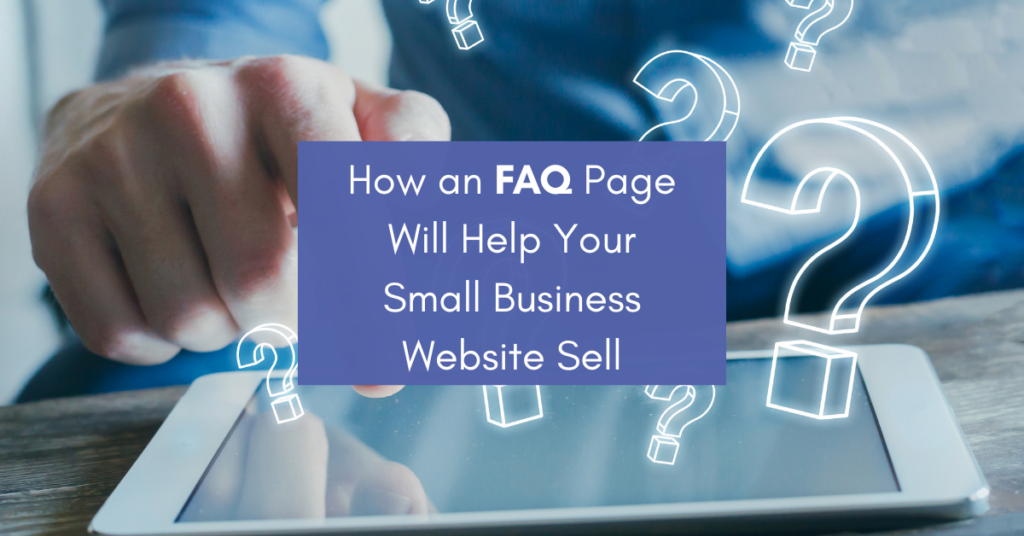
“Should I stay or should I go?”
No, we’re not singing the song by The Clash.
This is a question that’s being asked on your website every day.
Every day, visitors will:
- land on your website home page
- decide they want to stay and browse
- or decide to leave and hit the ‘back’ button
Sometimes the decision comes down to a question about your product or service.
Yes, a single question.
If the same person were in your store or office with that question, they’d simply ask the salesperson. No problem. But…
Asking questions on the internet? Slight problem.
It’s not that they can’t ask it online or that you don’t have a contact form.
It’s that it’s too easy to go to another site for the answer.
“Do you serve my area? Do you have a warranty? How long does your service take?”
If you’re not answering these kinds of common questions on your site, we can guarantee they’re going to leave for a competitor’s site that will.
Because some of these questions are objections they might have about your product or service. Resolving these objections helps convert them into paying customers.
So, we urge you to address these issues upfront with an FAQ page on your small business website.
That’s one way to boost lead generation on your website—by creating an FAQ page that answers common objections by your prospects.
Objections? FAQ? What’s this about?
Questions, doubts, skepticism … they’re all objections. And let’s face it – objections are a part of the buying process.
No matter what product or service you’re selling, there will always be people who are skeptical, have questions, or just need a little more convincing before they’re ready to buy. That’s where your FAQ page comes in.
An FAQ page is a page of Frequently Asked Questions. It’s a type of Q&A page, with a list of commonly asked questions and your answers.
Arm your online salesperson
As we’ve said in posts many times before, your website is your top salesperson online. And you want to arm your salesperson with the information to answer any questions, right?
This is the same concept, only you’re being proactive instead of reactive. Don’t wait for prospects to come to you with their objections—anticipate them and address them on your FAQ page.
It’s important because website visitors are in research mode. They’re sitting on the fence, waiting for the right information to persuade them to buy or call. Your FAQ can offer that information.
How do you create an effective FAQ page?
First, start with the basics. What are the most common questions you hear from prospects? What are the things they always seem to be confused about? Start by answering these questions on your FAQ page.
Then think about risk reversal. People want to know how they can minimize their risk in doing business with you. What can you tell them?
Do you have a warranty, money-back guarantee or policy that will help? Try to answer the question: “What happens if I’m not satisfied with your product or service?”
Lastly, look at top objections. Think about what causes prospects to hesitate when buying. This list often includes price, time, trust or unfamiliarity with the product/service.
Is price a top objection? You can address this without having to break down your costs. Instead, explain the value of your product/service and what sets you apart from others. Help them understand why yours is worth the investment.
RELATED: Another way to answer objections is in real-time by chat. Find out on this post.
A few tips to keep in mind
Be honest. If your prospects consistently ask about a potential drawback to your product or service, don’t shy away from it. Be upfront and transparent about any limitations or challenges. This will actually help build trust with your prospects.
Use plain language. Don’t try to impress people with fancy jargon or industry terms. Use language your prospects will understand easily.
Update regularly. Your business will evolve over time, and so should your FAQ page. Make sure you’re regularly reviewing and updating your FAQ section to make sure it’s still relevant and accurate.
Design for readability. An FAQ page can seem like a long block of text. But a few techniques can help readers scan and find the answers they need. Try prioritizing questions by popularity, splitting the list into categories, or using accordion boxes or expandable sections (where the reader clicks to reveal the answer).
At the end of the day, an FAQ page can be a powerful tool for your small business website and its ability to generate leads.
By anticipating and addressing common objections, you can help ease prospects’ fears and encourage them to contact you or purchase. So, take some time to build a great FAQ page. Your business will thank you for it.
Need help with your FAQ page or website? Get in touch!
Leave a Reply